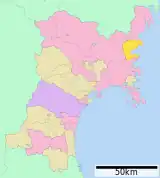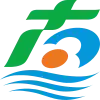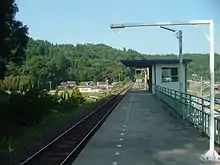Minamisanriku
Minamisanriku (南三陸町, Minamisanriku-chō, "South three land"), also spelled Minami Sanriku, is a resort town on the Pacific Coast of Miyagi Prefecture, Japan.[1] The town has an area of 163.74 square kilometres (63.22 sq mi), and as of October 1, 2004 the population of the area was 19,170. The town was created on October 1, 2005, when the towns of Shizugawa and Utatsu merged to form the new town of Minamisanriku.



Minamisanriku was largely destroyed by the Japanese 2011 tsunami, with most buildings swept away by waves of 16 metres (52 ft) or more. Over half the town's population is missing and almost certainly dead.
2011 earthquake and tsunami disaster
95 percent of the town was destroyed by the 2011 Japanese tsunami that followed the 2011 Tōhoku earthquake. Only the tallest buildings remain and an estimated 9,500 people are missing, roughly half the population.[2][3][4][5] 9,700 people are confirmed alive and evacuated.[6]
The town had two evacuation centres where residents could go to escape from a tsunami. One was on the southern headland overlooking the town. The other was inland away from the center of the town. Although both were 20 meters above sea level, the tsunami covered them and washed people away.[7] At least 31 of the town's 80 designated evacuation sites were inundated by the tsunami.[8]
One early report suggests that many residents may have evacuated to the nearby city of Tome, Miyagi.[9] According to an English teacher at the local high school located on a hill above the tsunami, "The entire town was simply swept away. It just no longer exists. There were around 7,000 of us on the hill that day. Perhaps a few thousand at the school on the hill opposite. But there are 17,000 in the town. All the others have gone." Since the schools were all on high ground, many children were orphaned.[10] Survivors wrote "SOS" in white lettering,[11] in the playing field of Shizugawa High school.[12]
When the earthquake struck, the mayor of the town, Jin Sato (佐藤仁), was talking at the town assembly. They were discussing the much smaller tsunami caused by the March 9 foreshock before the March 11 earthquake.[13] The three-story building of the town's Crisis Management Department (防災対策庁舎, Bōsai Taisaku Chōsha) was covered by the tsunami. Out of the 130 people who worked at the town hall, Sato was one of only 30 who reached the roof. He was one of only 10 who survived.[13][14] He returned to government affairs, founding the headquarters for disaster control at the Bayside Arena on March 13, 2011.[13]
Shizugawa hospital was one of the few major buildings that survived the tsunami. However, it was partly flooded, and 74 out of 109 patients died.[15] Close to 200 people were rescued from the roof of the building.[16]
Miki Endo (远藤未希), a 25 year old employee of the town's Crisis Management Department, continued to broadcast warnings and alerts over a community loudspeaker system as the tsunami came in. People believe she saved many lives. The three-storey headquarters of the department remained standing but only the steel frame remained. All of the interior and walls were destroyed. After the disaster, Endo was missing and was later found dead.[17] Photos show the roof of the building completely submerged at the height of the tsunami. Some people held onto an antenna on the roof.[18][19]
International response
The town is the site of the first field hospital established by an outside nation offering assistance following the disaster. A team of five doctors from Israel set up a surgery.[20] A 53 member group of medical personnel from the Home Front Command and the IDF’s Medical Corps opened a field hospital near Minamisanriku on March 29. The clinic included surgical, pediatrics and maternity wards, and an intensive care unit, pharmacy and laboratory along with 62 tons of medical supplies. The clinic began treating patients immediately.[21][22]
On April 23, 2011, the Prime Minister of Australia Julia Gillard visited Minami Sanriku.[23]
1960 tsunami
The Great Chilean Earthquake of 1960 caused a tsunami that crossed the Pacific Ocean and struck the then town of Shizugawa. That tsunami was as high as 2.8 metres (9.2 ft),[24] At that time, the damage was considered extensive.[25] As a result, two-storey-high harbor walls were built by 1963, and residents held tsunami drills each year on the anniversary. The harbor walls were ineffective in the 2011 tsunami, which washed over four-storey buildings.[26]
To mark the 30th anniversary in 1990, a bilingual Spanish-Japanese plaque was installed, with a message from President Patricio Aylwin of Chile, accompanied by a replica moai statue. The plaque survived the 2011 tsunami.[27]
The 2010 Chile earthquake caused a 1.3-metre (4.3 ft) tsunami in Minamisanriku.[28]
Transportation

The Kesennuma Line includes the following stops: Rikuzen-Togura, Shizugawa, Shizuhama, Utatsu, and Rikuzen-Minato. Major roads include Route 45 and Route 398.
Related pages
- Kesennuma
- Minamisōma
- Rikuzentakata
References
- Inside Minamisanriku Channel 4 News, 13 March 20011
- "9,500 still unaccounted in Minamisanriku of Japan's Miyagi Prefecture: Kyodo". Xinhua News Agency. Retrieved 2011-03-12.
- Kyung Lah, CNN (March 12, 2011). "Rescuers scramble to save lives as aftershocks jolt Japan". CNN.com. Retrieved 2011-03-12.
{{cite news}}:|author=has generic name (help) - "9,500 People Reported Missing in Small Town Following Japan Quake". Archived from the original on 2011-07-13. Retrieved 2011-07-18.
- Horiuchi, Junko, (Kyodo News) "Evacuees persevere, eye future", Japan Times, 29 March 2011, p. 3.
- (Japanese)
- Natures fury leaves a silt-covered graveyard The Age, 16 March 2011
- Kyodo News, "Tsunami hit more than 100 designated evacuation sites", Japan Times, 14 April 2011, p. 1.
- 2,000 bodies found on Japanese shores ABC Sydney, 14 March 2011
- Minamisanriku: Japan's tsunami-hit ground zero Channel 4 News, 14 March 2011
- Flock, Elizabeth (March 13, 2011). "Japan tsunami: Minamisanriku, a fishing port that vanished". The Washington Post. Retrieved 18 March 2011.
- Zenrin Co. Ltd. (2011). "Google Maps". Google Maps. Retrieved 18 March 2011.
- "安否不明の町長生還 骨組みだけの庁舎で一夜 宮城・南三陸" (in Japanese). Kahoku Shimpo. March 14, 2011. Archived from the original on March 16, 2011. Retrieved March 15, 2011.
- "南三陸町 庁舎10人奇跡の生還" (in Japanese). Tokyo Shimbun. March 15, 2011. Archived from the original on March 20, 2011. Retrieved March 15, 2011.
- "南三陸町 津波" (video). YouTube.com (in Japanese). at 01:16 (hospital); at 04:57 (crisis management department building). Retrieved 2011-04-23.
- Carswell, Andrew (March 14, 2011). "Minami Sanriku - the town that disappeared in the Japan earthquake". The Daily Telegraph. Retrieved 16 March 2011.
- "宮城県南三陸町の職員、遠藤未希さん(24)が亡くなったことが確認されました。" (video). YouTube.com (in Japanese). Retrieved 2011-05-12.
- "Miki Endo (远藤未希), missing heroine of Minamisanriku" (video). NHK World. Retrieved 2011-04-23.
- "[画像]宮城県南三陸町の防災対策庁舎の人を押し流す津波+南三陸町津波動画" (in Japanese). Retrieved 2011-04-23.
- "Israel first to set up field hospital in Japan", The Jerusalem Post, 21 March 2011, retrieved 2011-03-21
- Katz, Yakov (29 March 2011). "IDF field hospital officially open doors to Japanese". The Jerusalem Post. Retrieved 2011-03-30.
- "IDF medical delegation to Japan treats homeless baby". The Jerusalem Post. 30 March 2011. Retrieved 2011-03-30.
- "豪首相、宮城・南三陸町を訪問" (video). YouTube.com. Retrieved 2011-04-23.
- ataq411 (8 April 2011). "Shizugawa Hospital, Minamisanriku-cho, Miyagi" (photo).
legend on marker in photo reads:
昭和35年5月24日
チリ地震津波水位
2.8m{{cite web}}: CS1 maint: numeric names: authors list (link) - "かつての宮城県志津川町(現・南三陸町) 津波への取り組み(1990年)" (video). YouTube.com (in Japanese). Retrieved 2011-04-26. (video shows damage from 1960 tsunami)
- Todd Pitman. "Japan tsunami: Nothing to do but run". Associated Press. Archived from the original on 2011-10-03. Retrieved 2011-04-23.
- "南三陸町 Minamisanrikucho #5" (video). YouTube.com. Retrieved 2011-04-23.
REPUBLICA DE CHILE
A la Ciudad de Shizugawa:
El Moai, muestra de la cultura chilena testimonia en la ciudad de
Shizugawa la amistad entre ambos pueblos que están unidos por el
mismo mar aquel sobre el que el poeta Neruda escribio:
"La dentellada del mar muerde
la abierta pulpa de la costa
donde se estrella el agua verde
contra la tierra silenciosa"
Patricio Aylwin
Presidente de la Republica de Chile - "宮城・南三陸町で130cmの津波観測 漁港で冠水も(10/02/28)" (video). YouTube.com (in Japanese). Retrieved 2011-04-24.
Other websites
- Official website (in Japanese)
Videos
- Video showing aerial view, before and after: "Minamisanriku – before and after the tsunami" (video). YouTube.com. NHK World. 2011-03-11. Retrieved 2011-04-26.
- Video of tsunami, shot from Shizugawa High School (志津川高校): "南三陸町志津川高校から見た津波の様子" [Tsunami attacking in Minami-Sanriku] (video). YouTube.com (in Japanese). 2011-03-11. Retrieved 2011-04-21. 38.6813°N 141.4398°E
- Another video from a similar vantage point as above, showing a wider-angle view of some parts: "画質調整版 南三陸町 志津川 Japan earthquake, tsunami" (video). YouTube.com. 2011-03-11. Retrieved 2011-04-26.
- Video of tsunami, shot from Shizugawa Junior High School (志津川中学校): "南三陸町を襲った津波の一部始終" [tsunami Minamisanriku, Miyagi, Japan] (video). YouTube.com (in Japanese). 2011-03-11. Retrieved 2011-04-21. 38.6864°N 141.4433°E
- video shot from a train (facing east) in 2009, stopping at Shizugawa Station and then proceeding to Rikuzen-Togura Station on the Kesennuma Line. Satellite photos (e.g., in Google Maps) and aftermath videos show that virtually every building visible (except the very largest white buildings in the background) in the first three minutes, and in the final minute, were washed away in the 2011 tsunami, as well as the train track and infrastructure and both stations; buildings and track in the middle part were undamaged. "Kesennuma Line Window View from Approching Shizukawa Sta. to Rikuzen Tokura" (video). YouTube.com. 2009-03-22. Retrieved 2011-04-26.
- The same train trip in the opposite direction, in 2010: "気仙沼線 陸前戸倉⇒志津川 車窓 キハ110系 2010年1月2日撮影" (video). YouTube.com. 2010-01-02. Retrieved 2011-06-01.
- Tsunami aftermath videos (driving around in the town): #1 #2 #3 #4 #5 #6 #7 #8 #9 #10 #11
- video shot inside Shizugawa Hospital, showing tsunami damage reaching as high as the fourth floor: "宮城県南三陸町「志津川病院」壊滅屋内映像!4階部分ハイビジョン" (video). YouTube.com. 2011-04-22. Retrieved 2011-06-06.
- News Video of Tsunami Destroying Minamisanriku Archived 2017-03-31 at the Wayback Machine The Telegraph, UK news outlet
- Video of Tsunami Aftermath in Minamisanriku "Some Kind of Armageddon", Channel 4 News, UK